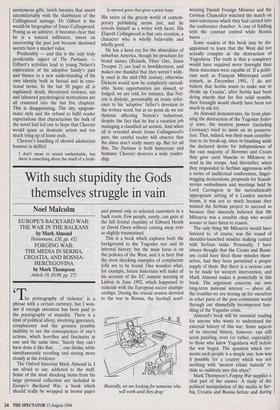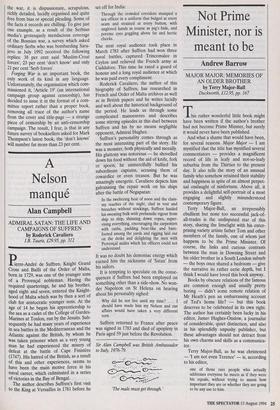With such stupidity the Gods themselves struggle in vain
Noel Malcolm
he pornography of violence' is a phrase with a certain currency, but I won- der if enough attention has been paid to the pornography of stupidity. There is a kind of political idiocy, involving ignorance, complacency and the grossest possible inability to see the consequences of one's actions, which horrifies and fascinates at one and the same time. 'Surely they can't have done it like that . . .', one thinks, while simultaneously recoiling and staring more closely at the evidence.
The Oxford historian Mark Almond is, I am afraid to say, addicted to the stuff. Some of the most shocking items from his large personal collection are included in Europe's Backyard War, a book which should really be wrapped in brown paper `T and passed only to selected customers in a back room. Few people, surely, can gaze at the full frontal stupidity of Edward Heath or David Owen without coming away ever so slightly traumatised.
This is a book which explores both the background to the Yugoslav war and its internal history; but the main focus is on the policies of the West, and it is here that the most shocking examples of complacent folly are to be found. One wonders what, for example, future historians will make of his account of the EC summit meeting at Lisbon in June 1992, which happened to coincide with the European soccer champi- onships. During the crucial session devoted to the war in Bosnia, the football scarf- Basically, we are looking for someone who will work until they drop.' wearing Danish Foreign Minister and the German Chancellor watched the match on mini-televisions which they had carried into the conference chamber. A case of fiddling with the contrast control while Bosnia burns ....
Some readers of this book may be dis- appointed to learn that the West did not actually conspire at the destruction of Yugoslavia. The truth is that a conspiracy would have required more foresight than these statesmen were capable of. If a politi- cian such as Francois Mitterrand could remark, in December 1991, 'I do not believe that Serbia wants to make war to divide up Croatia', after Serbia had been doing exactly that for five solid months, then foresight would clearly have been too much to ask for.
As Almond demonstrates, far from plan- ning the destruction of the Yugoslav feder- al state, the western powers (including Germany) tried to insist on its preserva- tion. That, indeed, was their main contribu- tion to its break-up, since in brushing aside the declared desire for independence of the vast majority of Slovenes and Croats they gave carte blanche to Milosevic to send in the troops. And thereafter, when they responded to Serbian aggression with a series of ineffectual conferences, finger- wagging declarations, proposals for Scandi- navian ombudsmen and meetings held by Lord Carrington in the surrealistically appropriate setting of a London auction house, it was not so much because they wanted the Serbian project to succeed as because they sincerely believed that Mr Milosevic was a sensible chap who would sooner or later listen to reason.
The only thing Mr Milosevic would have listened to, of course, was the sound of shoulder-launched missiles making contact with Serbian tanks. Personally, I have always thought that the Croats and Bosni- ans could have fired those missiles them- selves, had they been permitted a proper supply of them. But there is a serious case to be made for western intervention, and Mark Almond makes it powerfully in this book. The argument concerns our own long-term national interest — above all, the troubles we are storing up for ourselves in other parts of the post-communist world through our shamefully incompetent han- dling of the Yugoslav crisis.
Almond's book will be essential reading for anyone who wants to understand the external history of this war. Some aspects of its internal history, however, can still seem puzzling, even (or rather, especially) to those who knew Yugoslavia well before the war began. The question which tor- ments such people is a simple one: how was it possible for a country which was not seething with 'ancient ethnic hatreds' to slide so suddenly into this abyss?
Mark Thompson's Forging War supplies a vital part of the answer. A study of the political manipulation of the media in Ser- bia, Croatia and Bosnia before and during the war, it is dispassionate, scrupulous, richly detailed, lucidly organised and quite free from bias or special pleading. Some of the facts it records are chilling. To give just one example, as a result of the Serbian media's grotesquely mendacious coverage of the Bosnian war, a survey which asked ordinary Serbs who was bombarding Sara- jevo in July 1992 received the following replies: 38 per cent said 'Muslim-Croat forces', 23 per cent 'don't know' and only 21 per cent 'Serb forces'.
Forging War is an important book, the only work of its kind in any language. Unfortunately, the organisation which com- missioned it, 'Article 19' (an international campaign group against censorship), has decided to issue it in the format of a com- mittee report rather than a proper book, removing all trace of the author's name from the cover and title-page — a strange piece of censorship by an anti-censorship campaign. The result, I fear, is that in any future survey of booksellers asked for Mark Thompson's latest book, the 'don't knows' will number far more than 23 per cent.











































 Previous page
Previous page